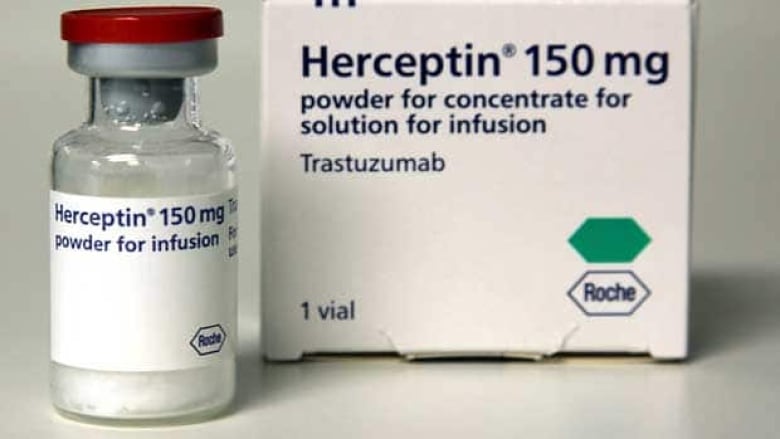The promise of Herceptin

The breast cancer drug Herceptin is a potentially life-saving treatment that reduces recurrence of the disease among those undergoing chemotherapy.
In late March 2011, Ontario announced it willexpand accessto certain cancer medications for patients who may benefit from the drugs but who do not meet current clinical guidelines for their use.
Ontario's health ministry said it will expand coverage for cancer drugs "where emerging evidence shows strong promise to benefit patients." Herceptin might be one of the candidates, Health Minister Deb Matthews said.
Ontario's policy pays for Herceptin for patients whose tumours are larger than one centimetre, because clinical trials have only been performed on patients with tumours that size and larger.
Patients with tumours smaller than one centimetre can get Herceptin coverage in B.C., Alberta and Saskatchewan and on a case-by-case basis in other provinces.
But there are no published findings on the effectiveness of Herceptin for patients with smaller tumours.
This isn't the first time that funding for Herceptin has been controversial. Previously, cancer specialists and their patients, provincial governments, and breast cancer activists struggled with a similar decision about paying for the drug for people in the advanced stages of breast cancer.
That's what the drug was approved for by the U.S. Food and Drug Administration in 1998. And it had proven quite effective in lengthening the lives of women in the late stages of breast cancer.
Herceptin therapy can cost $40,000 a year per patient.
Herceptin is an antibody that binds to a protein on human skin cells the human epidermal growth factor receptor 2 (HER2). It is believed an excessive amount of this protein increases breast cancer growth and increases the risk of recurrence of the disease and death.
Approximately 25 per cent of patients have this aggressive form of breast cancer.
Recurrence halved
In May 2005, three large-scale studies of the drug were abruptly halted because of overwhelmingly positive results.
The studies showed the rate of breast cancer recurrence was reduced by more than half when Herceptin was given to women undergoing chemotherapy compared to women who received traditional chemotherapy alone.
Among the findings:
- After two years, there were 261 events (such as return of the cancer, second primary cancer or death before recurrence) in the control group and 133 events in the group taking Herceptin.
- After three years, 87.1 per cent of patients taking Herceptin were alive and disease-free compared to 75.4 per cent in the group not taking Herceptin. After four years, 85.3 per cent of patients on Herceptin were still alive and well compared to 67.1 per cent for those on standard chemotherapy.
- Women taking Herceptin with a particular chemotherapy regimen had a 33 per cent reduction in risk of death.
Dr. Brian Leyland-Jones of Montreal's McGill University was the lead author on one of the studies. He called Herceptin the most important advance in breast cancer therapy in 30 years.
He noted that in traditional breast cancer therapy, one in four women will see their cancer spread sometime after undergoing surgery. In the Herceptin studies, that number dropped to one in 10.
"We're not quite sure [how Herceptin works]," Leyland-Jones said. "There are different factors that stimulate the growth of cells in your body. The targeted therapy interferes with the binding of this stimulating growth factor."
In October 2005, the New England Journal of Medicine reported on the three clinical trials. In an editorial, the Journal called the results "revolutionary."
"The results are simply stunning. With very brief followup (one to two and a half years), all three trials show highly significant reductions in the risk of recurrence of a magnitude seldom observed in oncology trials," the editorial said.
As many as 5,000 Canadian women a year stand to benefit from early use of Herceptin.
There is one significant side-effect. There is a small risk of heart damage in women undergoing Herceptin treatment. Approximately one woman in 200 could suffer heart damage.












_(720p).jpg)


 OFFICIAL HD MUSIC VIDEO.jpg)
.jpg)



























































































